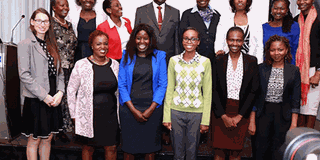Breaking News: At least 10 feared to have drowned in Makueni river
Why data is vital for gender advocacy

Kenya's high representative for Infrastructure Development in Africa Raila Odinga with women in engineering, during the Kenya infrastructure scorecard seminar in Nairobi on March 12, 2020. With data, it is easy to know the number of female engineers in the country.
PHOTO | DENNIS ONSONGO | NATION MEDIA GROUP
What you need to know:
- Without data, issues relating to women and girls will not count
- Groots Kenya has developed a gender data dashboard with visualised information on women’s status in relation to SDGs
- Dashboard a product of collaboration between Groots Kenya and Equal Measures 2030
- In Tanzania, young professionals are using girls’ generated data to tackle FGM
- Malawi’s consent to review abortion laws in 2015 was out of the ‘push’ of evidence (data)
Data-driven advocacy is gaining traction in Africa with women’s organisations building up crucial information to boost gender equality.
“Without data, issues relating to women and girls will not count,” said Femnet’s executive director Ms Memory Kachambwa, during a data-driven gender equality advocate during a data-driven advocacy forum in Nairobi.
Ms Kachambwa, who is also the Executive Director of African Women’s Development and Communications Network (Femnet) said.
Across Africa, gender equality advocates are making attempts to build up crucial data leading to eliminating various forms of discrimination against women and girls, thus bolstering their empowerment.
In Kenya, Groots Kenya, has developed a gender data dashboard with visualised information on women’s status in relation to 17 Sustainable Development Goals (SDGs).
The dashboard created in 2018, is a reservoir of data collected by women themselves and collated by Groots Kenya team.
Lived realities
It currently constitutes data on status of women in five counties; Kitui, Kakamega, Laikipia, Kiambu and Nakuru.
According to Ms Emily Maranga, Program Manager for Women Leadership and Governance at Groots Kenya, the data visualises women’s lives thus gives a ‘picture-perfect’ guidance in designing programmes addressing their issues.
“It (dashboard) visualises women’s lived realities,” she said during an interview on February 19, 2020 in Nairobi.
In coming up with the dashboard, Groots Kenya sensitised the women on the SDGs and the indicators to be measured in each target under SGDs Mashinani initiative.
Later, the women collected the information based on the indicators.
Further information is sought under each indicator drawing a picture on compounding challenges women and girls face.
“For instance, if it’s violence against women, we ask about the form, who has reported the violence and what was the response,” she said.
The dashboard is a product of collaboration between Groots Kenya and Equal Measures 2030, a UK established civil society which developed SDG Gender Index.
FGM
It is currently offline, however, Ms Maranga said it would be available to the public sometime this year, upon its launch by the two parties.
In Tanzania, a group of youth professionals under a non-governmental organisation, Young and Alive Initiative are using girls’ generated data to tackle female genital mutilation (FGM).
Government’s data on gender-based violence (GBV) showed high prevalence rates in Mbeya district, southwest Tanzania.
The 2011 statistics showed that 55 per cent of women between 15–49 years had experienced various forms of violence. But they were just statistics lacking recommendations on solutions.
So in 2019, the young professionals sought to fill the gap.
“Our focus was on FGM. We presented the statistics to the girls and women and asked them “what can we do?” said Ms Ninabina Dave, Policy and Advocacy Advisor in the organisation.
“We said ‘we need ambassadors but they said no! We already have ambassadors and they are community care workers’,” noted Ms Dave.
They realised the community respects and trusts community care workers and that women and girls confide in them whenever they are subjected to GBV.
The only problem being lack of information and skills on how to effectively respond to the respective issues.
Abortion laws
Now, Ms Dave and her colleagues are using these information to engage Tanzania’s government in coming up with a program on training the community care workers to become effective anti-GBV ambassadors.
Malawi’s government consent to review abortion laws in 2015 was out of the ‘push’ of evidence, according to Ned Mkumba, a Senior Field Officer at Malawi at Malawi’s Human Rights Resource Centre.
“We had to present the evidence on abortions for the government to listen to us. We had tried before but we found it difficult as we didn’t have the facts,” he said.
His organisation mobilised others across the country to collect information on unsafe abortions and their statistics showed more than 140,000 unsafe abortions were procured annually.
Pregnancy Bill
“We used this data to lobby the government to pass legislation on safe abortion,” he said.
In effect, the government has already tabled Termination of Pregnancy Bill in Parliament whose enactment would permit women to terminate pregnancy at will.
Presently, a woman can only procure abortion if the pregnancy is life threatening as determined by a doctor.
Ms Maranga, Ms Dave and Mr Mkumba participated in the data-driven advocacy forum held in Nairobi from February 17 to 20, 2020, where they shared in-country best practices in fostering empowerment of African women and girls.
The forum organised by Femnet, Forum for Women in Democracy (Fowode) and Groots Kenya converged Africa’s gender equality advocates from 12 countries.





